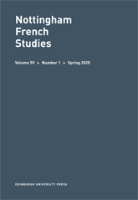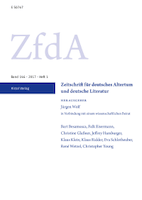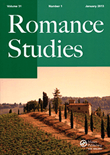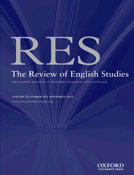
ARCHIV FUR DAS STUDIUM DER NEUEREN SPRACHEN UND LITERATUREN
Scope & Guideline
Fostering Critical Insights into Modern Linguistic Trends
Introduction
Aims and Scopes
- Interdisciplinary Literary Studies:
The journal publishes research that bridges various literary disciplines, integrating insights from history, cultural studies, and linguistics to provide a comprehensive understanding of texts. - Focus on Gender and Identity:
There is a significant emphasis on gender studies and identity politics in literature, exploring how these themes manifest across different cultures and historical periods. - Cultural and Historical Contexts:
Papers often analyze literary works within their cultural and historical contexts, examining how societal changes influence literary production and reception. - Critical and Theoretical Frameworks:
The journal encourages diverse critical methodologies, including postcolonial studies, queer theory, and psychoanalysis, to enrich literary analysis. - Global Literary Perspectives:
It highlights literature from various regions, promoting a global perspective that includes underrepresented voices and narratives in the literary canon.
Trending and Emerging
- Queer Literature and Critique:
There is a growing focus on queer literature and its intersection with religious and cultural critiques, reflecting broader societal discussions on gender and sexuality. - Literature and Globalization:
Emerging themes explore the impact of globalization on literary forms and narratives, emphasizing how global interconnectedness shapes cultural expressions. - Cultural Responses to Crisis:
Recent papers analyze literature's response to contemporary crises, such as pandemics and social upheaval, highlighting the role of literary discourse in understanding and coping with such events. - Environmental Literature:
An increasing number of studies address ecological themes and the representation of nature in literature, reflecting a heightened awareness of environmental issues within literary scholarship. - Intermediality and Adaptation:
There is a trend towards exploring intermediality, particularly how literature interacts with other media forms, such as film and digital narratives, indicating a shift in how literary texts are contextualized.
Declining or Waning
- Traditional Narratology:
There has been a noticeable reduction in papers dedicated to traditional narratological approaches, suggesting a shift towards more contemporary and hybrid narrative forms. - Classical Literary Canon:
Research centered on the classical literary canon, particularly works predating the 19th century, has waned, indicating a growing preference for more modern and diverse literary voices. - Historical Linguistics:
There is a decline in studies focusing on historical linguistics and language evolution, as the journal increasingly prioritizes contemporary language use and its sociocultural implications. - Regional Studies of Lesser-Known Literatures:
While the journal previously showcased a variety of regional literatures, there is a noticeable decrease in attention to lesser-known literary traditions, focusing instead on more mainstream narratives. - Pedagogical Approaches in Literary Studies:
Research on pedagogical methods in literary studies seems to be less frequent, suggesting a shift away from educational frameworks towards more theoretical explorations of literature.
Similar Journals

JOURNAL OF MODERN LITERATURE
Unveiling Contemporary Narratives and TheoriesJOURNAL OF MODERN LITERATURE, published by Indiana University Press, is a distinguished peer-reviewed journal that delves into critical examinations of modern literary texts and theories. Since its inception, the journal has served as a vital platform for scholars dedicated to the exploration of contemporary literature, making significant contributions to the discourse within the field. With an impressive ranking of Q2 in the Literature and Literary Theory category as of 2023, it positions itself among the top-tier journals in its domain, reflecting its strong impact within academic circles. This journal not only fosters scholarly dialogue but also embraces innovative approaches to literary criticism, ensuring relevance in today’s dynamic cultural landscape. Researchers, professionals, and students will find a rich repository of articles that engage with various modern literary paradigms, enhancing their understanding and appreciation of the intricate relationships between literature and broader socio-cultural contexts. Though it does not operate under an open access model, the journal's extensive reach through its digital ISSN (1529-1464) and print ISSN (0022-281X) allows for valuable insights to be disseminated to the appropriate audiences.

NOTTINGHAM FRENCH STUDIES
Cultivating Critical Perspectives in French ScholarshipNOTTINGHAM FRENCH STUDIES is a distinguished academic journal published by Edinburgh University Press, focusing on the diverse realms of French language, literature, culture, and history. With its ISSN 0029-4586 and E-ISSN 2047-7236, the journal serves as a vital platform for scholarly discourse, featuring interdisciplinary research that bridges gaps between Cultural Studies, Linguistics, and Literary Theory. Notable for its robust performance, it holds a Q3 ranking in Cultural Studies and Linguistics and a Q2 ranking in Literature and Literary Theory as of 2023, placing it among the key publications within its field. Throughout its publication span from 1996 to 2024, NOTTINGHAM FRENCH STUDIES has consistently catered to the academic community with insightful articles, enriching the understanding of French cultural contexts. While it is not an Open Access journal, its contributions are pivotal in advancing scholarly dialogue and fostering critical perspectives, making it an essential resource for researchers, professionals, and students engaged in French studies and its interdisciplinary connections.

ZEITSCHRIFT FUR DEUTSCHES ALTERTUM UND DEUTSCHE LITERATUR
Illuminating the Evolution of German Literary ThoughtZeitschrift für deutsches Altertum und deutsche Literatur is a pivotal academic journal dedicated to the exploration and analysis of German-language antiquity and literature. Published by S Hirzel Verlag, this esteemed journal is based in Germany and has been contributing to the fields of Linguistics, Language, and Literary Theory since its inception. With a history spanning from 1979 to the present, the journal showcases rigorous research and critical studies that enhance our understanding of both historical and contemporary literary landscapes. Although currently not an open-access publication, Zeitschrift für deutsches Altertum und deutsche Literatur operates within the Q4 quartile in its respective categories, reflecting a unique niche within the academic community. As a valuable resource for researchers, professionals, and students alike, it fosters a deeper appreciation for the intricacies of German literature and its evolution, serving as an essential platform for scholarly discourse.

Studi Slavistici
Cultivating Knowledge Across Slavic DisciplinesStudi Slavistici is an esteemed academic journal published by FIRENZE UNIV PRESS, focusing on the rich and diverse fields of Cultural Studies, Linguistics and Language, and Literature and Literary Theory. Since its initiation in 2004, it operates under an Open Access model, providing unrestricted access to its contents and fostering a wider dissemination of research. Based in Italy, this journal serves as a vital platform for scholars and researchers engaged in Slavic studies and beyond, encouraging interdisciplinary dialogue and innovative approaches. With its current Quartile rankings in the Q4 category across various domains, it plays a significant role in shaping dialogues within the academic community while offering insights into contemporary and historical perspectives. By maintaining an inclusive vision and engaging with critical issues, Studi Slavistici remains dedicated to advancing knowledge and scholarship in these intricate fields.

Comparative Literature-East & West
Exploring Literary Landscapes Across Borders.Comparative Literature-East & West is a premier journal published by Routledge Journals, Taylor & Francis Ltd, dedicated to advancing the field of comparative literature through its insightful analysis and diverse perspectives. Since its transition to an Open Access model in 2017, this journal has fostered a greater exchange of ideas among researchers, professionals, and students globally, ensuring that high-quality scholarship is accessible to all. With an impressive impact factor ranking it in the Q2 category for Literature and Literary Theory and Q3 in Cultural Studies as of 2023, it proudly sits at the forefront of interdisciplinary dialogue, examining the rich interactions between literary traditions across the globe. The journal’s emphasis on contemporary and historical analyses positions it as an essential resource for anyone keen to explore the complexities of cultural narratives and literary expression from 2017 to 2024 and beyond. Based in the United Kingdom, Comparative Literature-East & West continues to push the boundaries of literary scholarship, making significant contributions to both the arts and humanities.

Romance Studies
Unveiling the Rich Tapestry of Romance LiteraturesRomance Studies is a distinguished academic journal focused on the interdisciplinary exploration of Romance languages, literatures, and cultures. Published by Routledge Journals, Taylor & Francis Ltd in the United Kingdom, this journal offers a vital platform for scholars to disseminate cutting-edge research and critical analyses within the fields of literature and literary theory. With an H-index reflecting its academic influence and a 2023 Scopus ranking placing it in the 47th percentile, Romance Studies serves as an essential resource for researchers, professionals, and students passionate about Romance studies. The journal features a robust selection of articles that span a range of topics, encouraging dialogue and scholarly engagement among readers. Although it does not currently operate under an open access model, its rigorous peer-reviewed articles are instrumental for anyone seeking to enhance their understanding of Romance languages and literature from 1983 to the present.

Revista de Letras
Cultivating Intellectual Engagement Across BordersRevista de Letras is an esteemed academic journal published by Universidade Estadual Paulista (UNESP), dedicated to the fields of Literature and Literary Theory, as well as Philosophy. With its ISSN 0101-3505 and E-ISSN 1981-7886, the journal serves as a significant platform for the dissemination of scholarly research and critical thought, particularly within the Brazilian context and beyond. Operating from Araraquara, SP, Brazil, the journal spans the period from 2004 to 2023, featuring a diverse array of articles aiming to explore various literary and philosophical discourses. Despite its current Q4 ranking in both the Literature and Literary Theory and Philosophy categories, the journal continues to foster a vibrant academic community, promoting rigorous scholarship and intellectual engagement. Researchers, professionals, and students alike are invited to contribute to and engage with the evolving narratives presented in this publication, aiming to enhance understanding and facilitate discussions within these crucial fields.

Perspectives Medievales-Revue d'epistemologie des Langues et Litteratures du Moyen Age
Bridging Past and Present through Medieval EpistemologyPerspectives Medievales-Revue d'epistemologie des Langues et Litteratures du Moyen Age is a distinguished academic journal dedicated to the exploration and analysis of medieval languages and literatures, providing a unique platform for interdisciplinary scholarship. Published by SOC LANGUE & LITTERATURE MEDIEVALES OC & OIL, this Open Access journal has been committed to advancing research and knowledge dissemination since 2009. It serves as a vital resource for researchers, professionals, and students interested in the complexities of medieval textuality and linguistics, encouraging innovative perspectives and critical dialogues within the field. With its broad scope encompassing various aspects of medieval studies, the journal aims to stimulate scholarly discussion and inspire future research endeavors. Located in Paris, France, Perspectives Medievales plays a crucial role in promoting the understanding and appreciation of medieval studies on a global scale, contributing to the rich tapestry of humanistic inquiry.

MESTER
Unveiling New Dimensions in Humanities ScholarshipMESTER is a distinguished academic journal published by the UCLA College of Humanities, known for its commitment to advancing research in the fields of Cultural Studies, Linguistics and Language, and Literature and Literary Theory. With an ISSN of 0160-2764, this journal serves as a vital platform for scholars and professionals to disseminate innovative research and critical perspectives from diverse theoretical frameworks and cultural contexts. Although currently operating without an Open Access model, MESTER continues to uphold a rigorous peer-review process, ensuring that published articles maintain high academic standards. Recognized for its selective focus, MESTER holds a Q4 categorization in Cultural Studies and Linguistics, and Q3 in Literature and Literary Theory, situating it as a relevant, if emerging, voice within these disciplines. Housed within the significant repository of knowledge at UCLA, the journal beckons researchers, students, and practitioners to engage with its contributions to the humanities and build upon its foundations in cultural discourse.

REVIEW OF ENGLISH STUDIES
Cultivating Scholarly Discourse in English StudiesREVIEW OF ENGLISH STUDIES, published by Oxford University Press, is a prestigious journal that has been advancing the fields of Literature and Literary Theory as well as Linguistics and Language since its inception in 1925. With an impressive impact factor and a commendable ranking, placing it in the Q1 and Q2 categories across relevant disciplines, the journal serves as a vital platform for researchers, scholars, and students alike. Covering a wide range of topics from classical literature to contemporary linguistic analysis, REVIEW OF ENGLISH STUDIES is committed to fostering scholarly discourse and promoting innovative research methodologies. Although it does not offer open access, the journal is highly regarded for its rigorous peer-review process and high-quality publications, making it an essential resource for anyone engaged in English studies. For researchers seeking to keep abreast of the latest developments in the field, this journal stands as an indispensable guide and repository of knowledge.